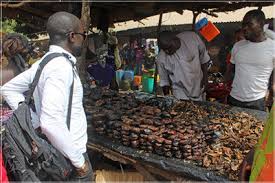Dwindling fortunes of Hadejia fish market
The dwindling fortunes of the famous Hadejia fish market began following the return of business activities in the two renowned fish markets of Maiduguri and Baga in Borno state respectively. Kasuwar Jan Bulo, as it is being widely called, thrived in fish business in the last few years after the ban of fishing activities in […]

The dwindling fortunes of the famous Hadejia fish market began following the return of business activities in the two renowned fish markets of Maiduguri and Baga in Borno state respectively.
Kasuwar Jan Bulo, as it is being widely called, thrived in fish business in the last few years after the ban of fishing activities in the Lake Chad by security operatives due to insurgency especially in Borno and Yobe states.
The market largely relies on local sources within Jigawa state and some villages around Lake Chad for fish supply, therefore when the two fish markets in Borno state were crippled by the insurgents, Hadejia fish market attracted many traders from Borno state and environs.
Kano Chronicle gathered that before the outbreak of insurgency, business of fish at Kasuwar Jan Bulo was not booming, but after the banning of fishing around Lake Chad, fish traders from various villages affected by the insurgency rushed to the Hadejia market, thereby boosting business activities tremendously.
The migration of the fish traders to the market reached a point that the market was ranked third after Baga and Maiduguri fish markets in term of fish supply having witnessed increase in the volume of supply of fish and massive turnout of patronizers.
It was said that over 500 vehicles supplied fish to the market on weekly basis, translating to the average of 70 vehicles arrived at the market on daily basis.
However, as normalcy began to return to many towns and villages around Lake Chad with residents returning to their villages in Borno and Yobe states, the fish business in Hadejia market is gradually declining.
It was observed that as many traders especially those from Borno and Yobe have now returned to their villages and towns, fish business has started shifting to Baga and Maiduguri fish markets, a development that is negatively affecting Kasuwar Jan Bulo.
Chairman of the Hadejia Fish Dealers Association, Alhaji Haruna Shu’aibu, recalled that at the peak of Boko Haram insurgency, Hadejia market was a beehive of commercial activities as it was the safe heaven for fish traders from across the northeast and the neighboring countries of Chad and Niger republic.
Shu’aibu maintained that despite the spate of terrorism, it took years before the fishing activity was banned in Lake Chad and within that period there was no market for the ever increasing stock apart from Hadejia market.
He said as at the time, the association of Kasuwar Jan Bulo had to look for another place to contain the then ever increasing influx of businessmen.
“Before the closure of Maiduguri and Baga fish market, we could only transact fish business of no more than N100m but at the peak of Boko Haram when the two markets closed down, money involved in business transaction in
Hadejia fish market was over N400m in a week.”
When Kano Chroncile visited the fish smoking section of the market, Ishiyaku Mohammed, said it was only the supply of commodity that dropped but buyers were still trooping into the market to buy fish.
Mohammed said there were over 350 fish smoking panels in their lane, adding that a big smoking panel could contain 1000 pieces of small fish or 120 bigger size fish.
Another trader, Musa Kallamu, who sales fried fish in the market, said he had been into the business for over 40 years, adding that fish business was an organized trade whereby everyone operates in accordance to his area of specialty.
He said since, he joined the business he had been in the fish frying section of the market, hawking fried fish within the surrounding villages before he finally settled in one place.
A smoked fish seller, Mohammed Sani Natanko told our reporter that fish supply in the market had dropped by about 80 percent after resumption of fishing in Lake Chad, adding that the scarcity of the commodity shoot up the prices of fish in the market.
He regretted that now that traders had deserted the market for Baga and Maiduguri fish markets, the business was declining on daily basis, saying,
“owing to the scarcity of the commodity in the market, we sell a carton of fish as high as N35,000 as against its former price of N20,000.”
